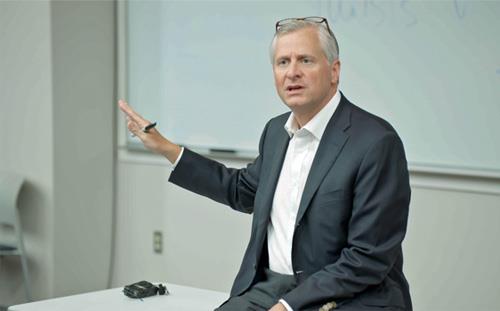
If you're thinking America has never been so close to the brink of apocalypse, you might find it either troubling or reassuring that yes, we have.
Historian Jon Meacham (top), for one, finds the notion comforting, and he explains why in an HBO documentary titled The Soul of America, which dramatizes Meacham's 2018 book of the same name and premieres Tuesday at 9 p.m. ET on HBO.
Meacham has risen a few notches above many of his peers in the crowded field of contemporary socio-political historians, and The Soul of America, in addition to examining the soul of America, helps explain why.
We do live, Meacham allows, in a polarized time. As an historian, he adds that we have lived in polarized times before and often come out the other side in a better position.
That better position almost always came at a high cost, of course, and The Soul of America's TV version has less time than the book to acknowledge and explore those costs.
Meacham also acknowledges that, as they say in the financial advice sector, past results are not a guarantee of future performance.
He warns, repeatedly, that only an engaged and informed citizenry can survive and ultimately surmount a crisis. While The Soul of America is not one of the hundred TV specials these days begging Americans to vote, that's an implicit part of its message. Scheduling it to air a week before a presidential election, let us suggest, can't be coincidental.
Like the book, Katie Davison's TV documentary version makes its case by looking at specific flashpoints in American history. They weren't selected because they were all triumphs, but because they illustrate how Americans have reacted to different crises and how those reactions are sufficiently entwined with the American soul that we are seeing many of the same instincts in play today.
One featured segment notes the divide over isolationism in the 1930s, when millions of Americans wanted to stay out of "Europe's war" and a core component of that movement included American Nazis.
While FDR didn't buy strict isolationism, Meacham notes, the gulf wasn't bridged until Japan attacked Pearl Harbor and galvanized America's will to fight.
The women's suffrage movement struggled for 80 years to secure a Constitutional amendment guaranteeing women the right to vote. The Civil Rights Act of 1964 and the Voting Rights Act of 1965 both followed a century of unapologetic discrimination and suppression.
Meacham himself was raised in the South and always had, as he explains it here, a fascination with the past. He became the very young editor of Newsweek and his own political involvement began with his work for Ronald Reagan.
He underwent a conversion of sorts over the years and today takes a more progressive view. Still, he repeatedly returns to the assertion that things get done when partisans acknowledge the other side also has a point.
While Meacham is hardly the first person to make that argument, he brings an impressive sheaf of historical ammunition to the table.
Perhaps his most important point comes in one of his first comments, when he argues the importance of seeing history as complex, riddled with nuances and grey areas. Oversimplification, he suggests, is the enemy of enlightened policies.
In the end, Meacham takes no revolutionary new perspective on America then and now. If you're looking for something you didn't expect, the most striking candidate might be tobacco; when he's not speaking on stage, Meacham seems to smoke like a character out of Mad Men.
The Soul of America itself is more like a literate, informed, valuable reminder to take a step back and consider how we've navigated our first two and a quarter centuries.